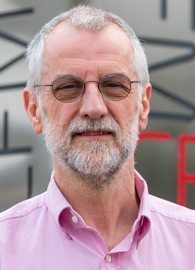| Education: |
|
PhD:
BSc: |
Experimental
Polymer Physics, University of the Basque Country (Spain). Sept 1984
Physics, University of Navarra (Spain). Jun 1979 |
|
|
| Positions: |
|
| 1999- |
Member of
the "Centro de Física de Materiales" CSIC-UPV/EHU
Joint Center of the Spanish Scientific Research Council and the University
of the Basque Country.
|
| 1994- |
Full Professor,
University of the Basque Country, Faculty of Chemistry. Department of Material
Physics |
| 1988-1994 |
Assistant
Professor, University of the Basque Country, Faculty of Chemistry. Department
of Material Physics |
| 1981-1988 |
Lecturer,
University of the Basque Country (UPV/EHU), Faculty of Chemistry. Department
of Physics |
|
|
| Main Activities: |
- Responsible of the Dielectric Relaxation
Laboratory. Accessible to external EU users in the EUSMI framework
- Academic Responsible of the PhD program Physics of Nanostructures and Advanced Materials
|
|
|
| Current Research Interests: |
Dynamics
of polymer materials and related topics. Dynamical processes ranging from
the very local intra-molecualar motions, the cooperative segmental relaxation
associated to the glass transition upto the large scale dynamics. In the
former case the main objective is to identify the molecular origin of the
secondary relaxations in polymers. In the second case there is a two fold
objective: i) to know to what extent the segmental dynamics of amorphous
polymers share the universal properties of the structural relaxation process
of the small molecule glass-forming systems; ii) to understand how the segmental
dynamics of a given polymer is modified when this polymer forms a part of
a multi-component system. Finally, concerning the large scale dynamics,
the main interest is to know the effect of polymer architecture on these
processes.
The dielectric relaxation techniques are the main experimental tools
used in this research. However, the basis of the research methodology consists
in combining the dielectric relaxation with other complementary experimental
techniques. |
|
|
Researcher Identification Codes
|
Researcher ID: P-3715-2019
ORCID Code: 0000-0001-6125-8214
|
Metrics
|
Citations, H-index,
...
|
| List of Recent publications: |
Included as part of the publications of the
PSMG reasearch group
|
